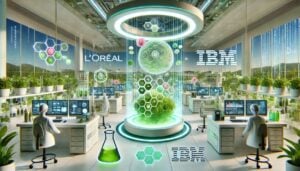
L’Oréal and IBM join forces to redefine cosmetic sustainability through generative artificial intelligence (AI).
A project that promises innovative, personalized, and ecological formulations, establishing a new standard in the beauty and sustainability sector. Let’s see all the details in this article.
Generative AI and sustainability: the future of cosmetic formulations thanks to l’Oréal
L’Oréal has embarked on a strategic alliance with IBM to leverage the potential of generative artificial intelligence (GenAI), aiming to radically transform the cosmetic sector.
The partnership, an example of cutting-edge innovation, aims to develop a tailor-made AI model to accelerate research and innovation (R&I) of the company. Specifically focusing on more sustainable and personalized formulations.
At the center of this collaboration is the goal of reducing material waste and energy consumption, addressing some of the most pressing challenges for the beauty industry.
The personalized AI model, described as the first of its kind specifically designed for the cosmetic sector, is designed to analyze a vasto database of formulas and ingredients.
This advanced technology will not only improve the speed of development of new products, but will also allow the reformulation of existing ones with renewable materials and more ecological methods.
According to Stéphane Ortiz, Head of Innovation Métiers & Product Development at L’Oréal R&I, this initiative is part of a broader digital transformation program:
“The partnership with IBM allows us to expand the reach of our innovative pipeline, ensuring that our products are not only inclusive and personalized, but also in line with the highest sustainability standards.”
The integration of AI and beauty
The combination of L’Oréal’s scientific experience and IBM’s advanced AI technologies represents an extraordinary example of how technology can redefine entire sectors.
While AI is already widely used to enhance packaging and personalization, the focus on sustainable formulations represents a significant shift towards greater environmental awareness.
Matthieu Cassier, Chief Transformation & Digital Officer of L’Oréal R&I, emphasized the importance of collaboration:
“This project marks a new era in our innovation process, leveraging years of experience in beauty science and data management.”
At the center of this initiative are the foundational models, an AI technology capable of handling enormous amounts of data and transferring knowledge between different applications.
Although initially developed to revolutionize natural language processing, IBM has extended the capabilities of these models to sectors such as chemistry, geospatial analysis, and time series.
For L’Oréal, the AI model will process data related to cosmetic formulas and raw material components, accelerating the creation of new products and the reformulation of existing ones.
This ability not only optimizes the work of research teams, but also contributes to establishing new sustainable practices in the industry.
According to Alessandro Curioni, IBM Fellow and VP for Europe and Africa:
“This collaboration demonstrates how generative AI can be a powerful tool to support corporate sustainability goals, transforming complex data into useful insights.”
The importance of renewable ingredients for a more sustainable future
One of the most innovative aspects of this partnership is the possibility to deepen the knowledge of the behavior of renewable ingredients in cosmetic formulations.
This understanding could not only improve the quality of the products, but also significantly reduce the environmental impact of the industry.
Guilhaume Leroy-Méline, IBM Distinguished Engineer and CTO of IBM Consulting France, highlighted the value of collaboration:
“By combining specialized expertise in AI and cosmetics, we can revolutionize the way beauty products are developed, emphasizing sustainability and diversity.”
In other words, for IBM, this initiative represents an extension of its strategy to apply AI in sectors with specific needs.
The creation of customized models for companies like L’Oréal demonstrates how technology can be adapted to tackle unique challenges, offering innovative and sustainable solutions.
If this partnership is successful, it could become a replicable model for other industries seeking to integrate sustainability and advanced technology.

 9 months ago
53
9 months ago
53




 English (US) ·
English (US) ·